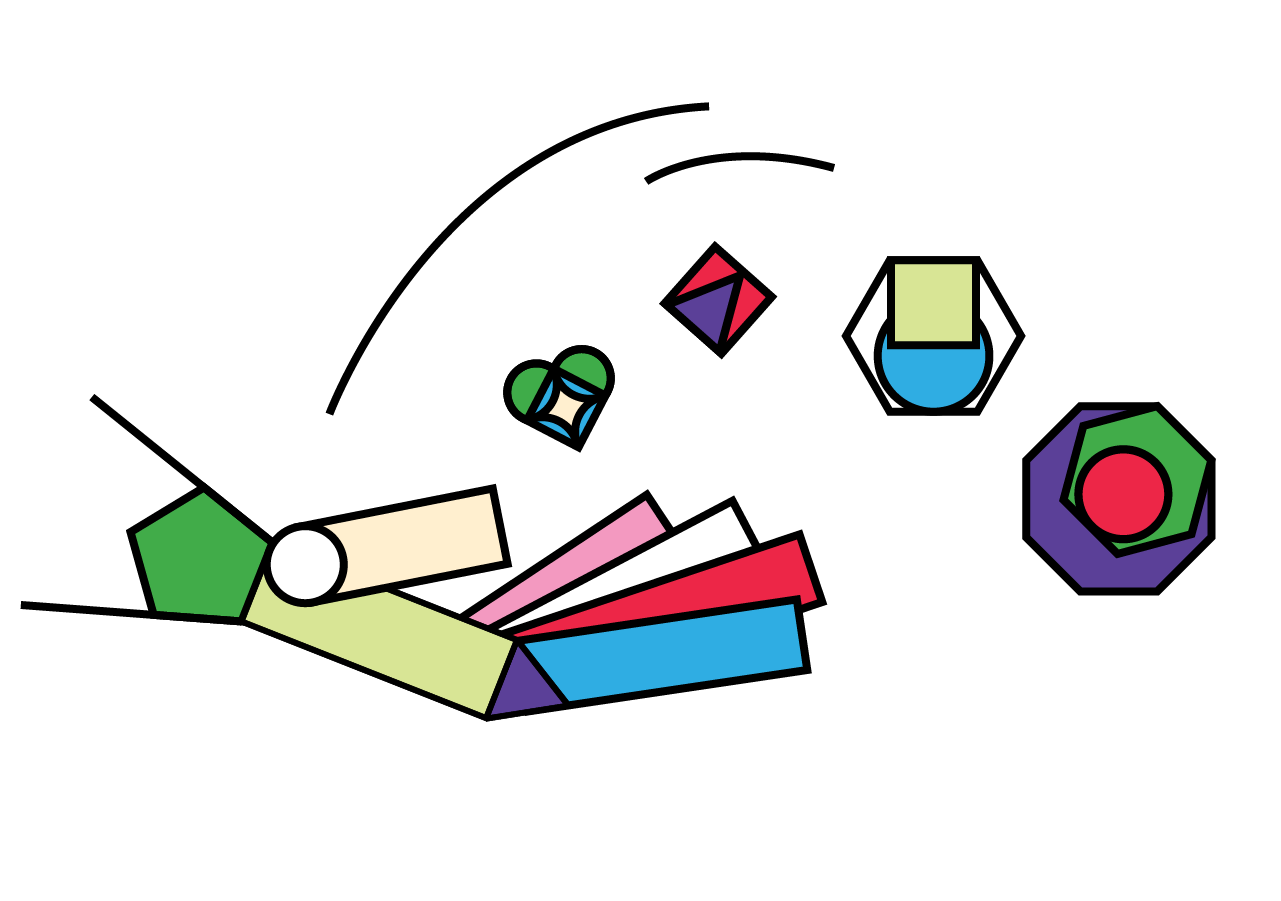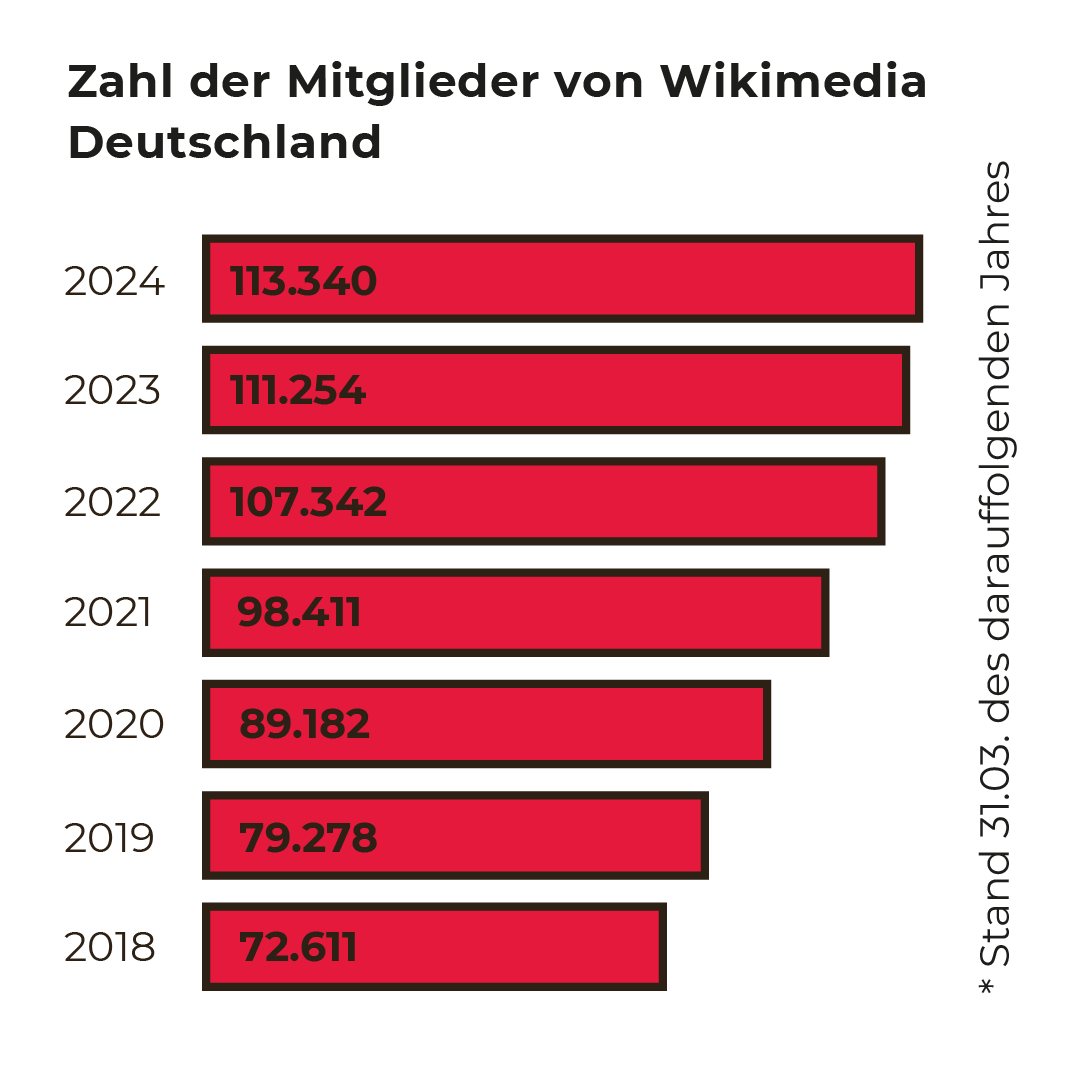Wikimedia
Our commitment to Free Knowledge – more decisive than ever


Our commitment to reliable online information has never been more important than it is today. Fake news is used to influence election campaigns, artificial intelligence enables deceptively real fakes, and facts are increasingly becoming a matter of opinion. It is now all the more important to strengthen Free Knowledge projects such as Wikipedia as a counterbalance! In 2024, Wikimedia Deutschland was able to set the course for important aspects of its work – from the first Wikipedia Future Congress to a new strategy for the association, and the strengthening of digital commons on an international level. We are particularly pleased that more and more people are supporting us in our commitment to Free Knowledge.
Wikipedia in transition: Future congress discusses challenges and opportunities
The German-language Wikipedia alone is accessed around 26 million times a day, making it one of the top ten websites. But the online encyclopedia is also facing challenges: The way we use media is changing rapidly and the growing influence of artificial intelligence in particular could pose a threat to Wikipedia in the medium term. More and more people are accessing information via AI-supported search engines and voice assistants without recognizing the source or visiting Wikipedia. This could lead to a decline in page views, which would affect Wikipedia’s visibility and relevance.
In order to be prepared for these developments, we initiated the Wikipedia Future Congress together with the community, Wikimedia Austria and Wikimedia Switzerland in 2024. For three days, active Wikipedians, international experts and Wikimedia employees discussed the future of the knowledge platform in Nuremberg and online.
There was a consensus that the German-language Wikipedia should essentially remain the high-quality free encyclopedia with a passionate community that it is. At the same time, there were many ideas for change: The welcoming culture and onboarding of new volunteers should be improved, for example through optimized help pages and low-threshold participation formats. The use of artificial intelligence was also much discussed. AI-assisted tools in particular can support editors – but without replacing people as a reliable source. Many participants also wanted more space for marginalized knowledge and non-binary perspectives.
The ideas from the Future Congress were documented in detail and discussed further over the course of the year. In the summer, the members of Wikimedia Deutschland shared their ideas, and at WikiCon in the autumn, an in-depth exchange with the community took place in order to derive concrete measures.

Wikimedia Deutschland sets strategic course for the future
The future of Wikipedia was not the only focus in 2024; the association also asked itself which social changes for the world we would like to bring about with our work over the next few years. This resulted in the Strategic Alignment 2030 with five equally important priorities and concrete, measurable goals:
To ensure that everyone can continue to access Free Knowledge in the future, it is particularly important that the Wikipedia and Wikidata communities grow and remain active. The goals for 2030 therefore include increasing the number of regular contributors to the German-language Wikipedia by 10 percent. For the Wikidata community, the aim is to attract 30 percent more contributors. At the same time, we want many more people to use the content of Wikimedia projects. We want to increase the number of end users by 10 percent through new ways of accessing the projects, e.g. by making it even easier for open source developers to access our content and data and distribute it with their own applications.

At the same time, we want to use our political engagement to persuade even more decision makers to support Free Knowledge. Among other things, we want to increase the number of publicly funded institutions that implement open content and data by 50 percent – primarily through changes to laws and regulations. To this end, we also want to win over more of our association’s broad membership base.
20 years of Wikimedia Deutschland: Milestones, congratulations and a big celebration

Wikimedia Deutschland has been campaigning for free access to knowledge for 20 years now. We celebrated this special anniversary in the summer together with many who have accompanied us along the way: A vibrant party was held at the Berlin office, attended by volunteers from the Wiki Communities, members and employees, our partner organizations and many other guests. To mark the anniversary, we brought the association’s milestones to life online. In addition to many good wishes and a video of the big party, our 20-years-website also features lots of souvenir photos and audio recordings of people who had attended events such as the founding of the association, the launch of Wikidata or the first Wikimania in Frankfurt.
Major growth and strong willingness to donate
When Wikimedia Deutschland was founded in Berlin in 2004, the association had just under 100 members, including Wikipedia founder Jimmy Wales as an honorary member. Today, well over 111,000 people support us with a membership. In addition, there are hundreds of thousands of donors who support Wikipedia and Free Knowledge with their donations. 317,000 people participated in the 2024 donation campaign alone, and the donation target of €9.3 million was reached within 61 days. We would like to thank all members and donors for their fantastic active commitment!
Why digital commons are important – Wikimedia at the UN Future Summit
In 2024, we continued to campaign for Free Knowledge worldwide. One highlight was the UN Future Summit in New York, where the Global Digital Compact – a UN initiative to regulate digital technologies – was agreed upon. Wikimedia Deutschland board member Franziska Heine was on site. Together with Wikimedia representatives from around the world, she emphasized the important role of so-called digital commons. Whether free software, open learning resources or knowledge platforms such as Wikipedia: Digital commons support the sustainable development goals of the United Nations – especially in terms of quality education, climate action and social equity – and are now part of the Global Digital Compact.

With the Global Digital Compact, the United Nations have set an important example for an open and fair digital future. We are particularly pleased that digital commons are now gaining wider recognition. Wikimedia Deutschland is one of the few organizations actively promoting this issue – and we have campaigned to ensure that the voice of civil society is included in the negotiations.Franziska Heine
Goodbye Summit, hello Playbook
Over the course of 15 years, Wikimedia Deutschland organized the Wikimedia Summit. Wikimedians from all over the world came together to work on the development of the international movement. The last Summit of its kind took place in Berlin in 2024, with 170 participants from over 60 countries.
“At the Summit, we were repeatedly faced with the challenge of facilitating cooperation in a large and diverse group, bringing together different points of view and creating a space for equal participation,” says Eva Martin from the Governance & Movement Relations team. Based on this experience, the Wikimedia Playbook was created – a guide for moderation and decision-making in groups. The playbook is free of charge and helps organizations to develop joint strategies, define values and design processes. It can be used flexibly and supports teams inside and outside the Wikiverse in making collective decisions efficiently and inclusively.

Free Knowledge can only succeed in collaboration – now and in the future!
There was so much more that we achieved with our active commitment to Free Knowledge in 2024. We outline what this was exactly over the following pages of our annual report. None of this would have been possible without the dedicated support of so many people. We would like to take this opportunity to express our special thanks to all the volunteers in the Wiki communities who tirelessly expand and maintain Wikipedia, Wikidata and other free knowledge projects, to all the members and donors who make our work possible through their financial support, and to the many partners who work with us to strengthen free knowledge in a variety of ways.








